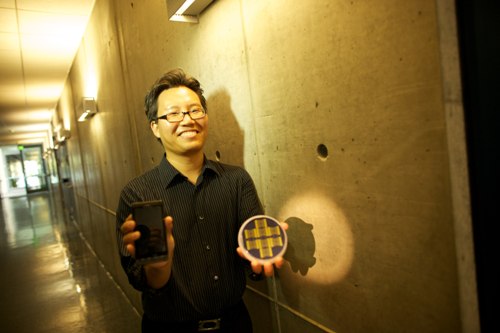Nano Engineered Applications, a company of Innovation Economy, has developed an ‘electronic nose’ prototype that is capable of detecting trace amounts of hazardous airborne substances based on a work by Nosang Myung, a professor at the University of California, Riverside, Bourns College of Engineering.
 Nosang Myung holds the sensor that allows for the detection of harmful airborne substances. (credit: UC Riverside)
Nosang Myung holds the sensor that allows for the detection of harmful airborne substances. (credit: UC Riverside)
A nanosensor array developed by Myung is the core component of the prototype. It utilizes functionalized carbon nanotubes to sense airborne toxins down to the level of parts per billion. The device also comprises humidity and temperature sensors, USB ports and a computer chip. The prototype’s Version 2, due out in a month, will also feature a Bluetooth unit and a GPS device for synchronization with a smart phone. The development team is assessing whether addition of Wi-Fi functionalities will add value.
The prototype is engineered to be integrated in three basic platforms, namely a smart phone, a wearable device, and a handheld device. Various platforms will be utilized based on applications.
Nano Engineered Applications exclusively licensed the relevant intellectual property from the University of California. The prototype shows promise in detecting combustion emission and gas leaks in industrial sites, pesticide levels in agriculture, chemical warfare agents in the military, and as warning systems for bio-terrorism in homeland security. The company plans to roll out the product within a year.
Nano Engineered Applications’ President, Steve Abbott stated that the company is working on reducing the footprint of the device and writing software for it. The current size of the device is about 4" by 7". The objective is to reduce it to a credit card size. At this size, a multi-channel sensor may detect as high as eight toxins. A single-channel sensor device may have the size of a fingernail.
Nano Engineered Applications is now seeking partners that could commercialize the production version. Abbott expects that the device will be initially marketed in the industrial field to monitor toxin and gas leaks, and emissions.
Source: http://www.ucr.edu/